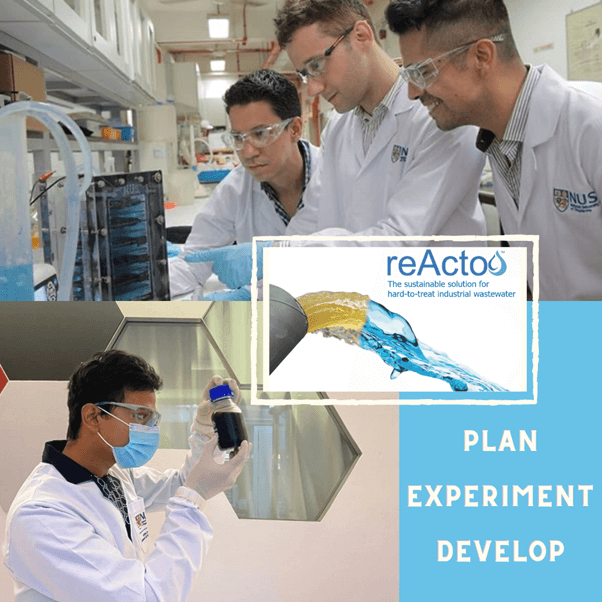Start-up founded by NUS researchers offers sustainable solution to treat industrial wastewater

Every year, the global industry produces more than 70 billion tons of wastewater with highly toxic, non-biodegradable pollutants, or so-called persistent organic pollutants (POPs) such as antibiotics, pesticides and dyes.
Currently, there exists no good solution to treat them fully—industrial wastewater containing POPs is often incinerated at a high cost or, even worse, it is improperly treated and released into the environment, where POPs accumulate through the biological chain and pose serious health hazards to people and our ecosystem.
An NUS collaboration between Prof Slaven Garaj (Department of Physics) and Prof Olivier Lefebvre (Department of Civil and Environmental Engineering) has resulted in the development of a patented technology that can completely decompose the POPs onsite, without leaving any residues. This enables industries to discharge their wastewater safely to the environment while saving on the treatment costs.
The core technology of the solution is an electrochemical advanced oxidation process (EAOP) which uses electricity to generate highly reactive ions that decompose POPs into water and CO2. “Advanced oxidation processes have been around for decades, but they were never widely adopted for concentrated wastewater due to their high costs and limited operating range—that is until now,” the environmental engineering lead of the project Prof Lefebvre explained.
The NUS team achieved the technological breakthrough with the design of a new type of electrodes with atomically bonded graphene-based materials. Prof Garaj who led the material development added, “Our grafted-graphene electrodes offer orders of magnitude increase in efficiency and stability, compared to other electrodes. This pushes the EAOP technology over a threshold of viability, making it a preferable solution for the removal of POPs.”
Graphene is an atomically thin sheet of carbon, with outstanding electrical conductivity and high surface area. Specially grafted into the electrodes, graphene leads to unmatched performance of the EAOP system in the decomposition of pollutants. This integration of advanced materials and electrochemical processes creates a unique solution that can safely treat POPs onsite: it eliminates any dangerous transportation of toxic waste, avoids the use of highly toxic chemicals and maximises water recovery.
Since 2016, the NUS scientists have been closely collaborating with NUS Enterprise and the Industry Liaison Office to focus their research on market-validated needs. One of the founders of the start-up Dr Xu Jianxiong said, “After participating in the Lean LaunchPad in 2016 and GRIP MAKE in 2020, it was clear that the graphene enhanced EAOP from NUS was best suited to treat industrial wastewater containing POPs.”

Our grafted-graphene electrodes offer orders of magnitude increase in efficiency and stability, compared to other electrodes. This pushes the EAOP technology over a threshold of viability, making it a preferable solution for the removal of POPs.
Asst/Prof Slaven Garaj
By 2021, the technology was patented, scaled up 100 times from its first lab prototype, and the integration of graphene was showing drastically better performances for an extended period of operation. “Considering the readiness level of our technology and the interest received by several companies through our market research, it was clear that it was time to bring this technology to the market,” Prof Lefebvre continued. “The performance of electrodes remains strong, even as we increase the process to the pilot scale.”
In 2021, Dr Massimo Spina and Dr Xu Jianxiong joined the Graduate Research Innovation Program of NUS (GRIP) with the support of their respective principal investigators Prof Garaj and Prof Lefebvre. At the end of three intense months of incubation, in June 2021, reActo Pte Ltd was incorporated with the goal to commercialise the patented graphene enhanced EAOP technology developed at NUS.
“The GRIP program not only gave us all the tools and knowledge required to set up a company but also there are business mentors to guide us along the way. We are very excited to bring our disruptive technology to market and to offer a sustainable solution for hard-to-treat industrial wastewater that can help industries save on disposal costs while preserving the environment,” co-founder of reActo Dr Massimo Spina said.
Considering the readiness level of our technology and the interest received by several companies through our market research, it was clear that it was time to bring this technology to the market. The performance of electrodes remains strong, even as we increase the process to the pilot scale.
A/Prof Olivier Lefebvre

After the NUS GRIP lift-off day on 3 June, reActo received pre-seed funds from NUS that will be used to further scale up the technology and to build a pilot system capable of treating one ton of industrial wastewater per day.
reActo is now in discussion with several end users to test-bed its product, and it is raising additional seed funding. “We aim to launch our first product in the market by 2022 in Singapore and then expand to South-East Asia and China in the coming years,” reActo’s founding team concluded.
Starting from Singapore, reActo aims to become a provider of advanced clean technologies to treat industrial wastewater for Asia and the world. For more information, visit: https://reactowater.com/.
